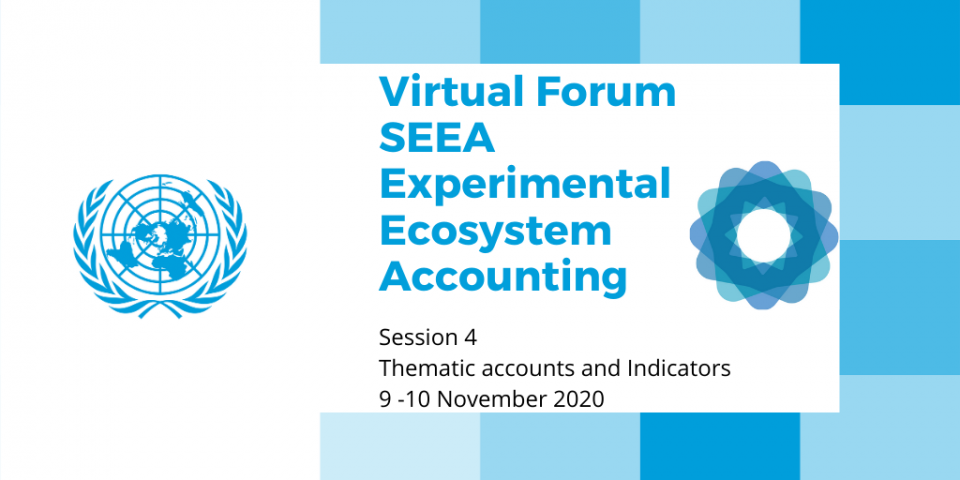Session 4 on thematic accounts and indicators of the Virtual Expert Forum on SEEA Experimental Ecosystem Accounting 2020

The Virtual Expert Forum on SEEA Experimental Ecosystem Accounting 2020 concluded with the Session 4 on thematic accounts and indicators, which was held on 9 and 10 November 2020.
The Session 4 consisted of two 3-hour meetings and had more than 300 registered participants from national statistical offices, international organizations, NGOs and academia. This session of the Forum provided an opportunity to raise awareness and engage with the indicators/policy community on the relevance of the SEEA to inform various global monitoring frameworks as well as support national policies. The session was opened by Mr. Stefan Schweinfest, Director of the UN Statistics Division, who stressed the contribution of the SEEA accounts to inform a wide range of topics, including biodiversity, climate change, oceans, etc. and underlined the opportunity for the statistical community to be engaged in the development and implementation of the monitoring framework for the post-2020 Global Biodiversity Framework alongside the scientific community.
On the first day, participants discussed the four thematic accounts – biodiversity, climate change, ocean and urban accounts. Most of the time was dedicated to presentations in parallel breakout groups, which consisted both of methodological and country example presentations. The discussions on the thematic areas aimed to answer questions related to (1) the role of thematic accounts for policy; (2) the aggregates and indicators that can be derived from the thematic accounts; (3) how to engage the relevant communities; and (4) what changes were needed in the draft of Chapter 13. Each parallel session on one of the thematic accounts had a distinct agenda and rich discussions.
On the second day, participants discussed the role of the SEEA Ecosystem Accounting (SEEA EA) in supporting global monitoring frameworks and in particular in supporting national reporting and policy and decision making. The session was organized into a plenary which discussed the relevance of the SEEA EA to current policy processes from the statistical and biodiversity perspective, as well as the general principles underlying the proposed post-2020 Global Biodiversity Framework monitoring framework. Breakout sessions discussed possible indicators that can be derived from the SEEA EA extent, condition, ecosystem services and monetary accounts.
Presentations and documents can be found here.
